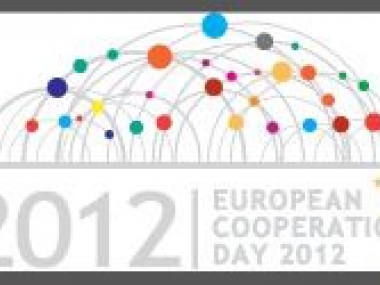European Cooperation Day 2012 – 21 September 2012
Edited on
06 September 2017The "European Cooperation Day", was celebrated on 21 September 2012! More than 65 European programmes dealing with Territorial Cooperation or cooperation at the external borders of the EU participated to the festivities. URBACT is one of these European cooperation programmes enabling cities to work together to develop solutions to major urban challenges. In all, almost 40 countries came together to consecrate cooperation and bridge-building between local communities across borders.

About the EU Cooperation Day 2012 celebrations
Public events took place during the week of 17-23 September all over Europe. Find the full list of events here. The most compelling examples of territorial cooperation actions can also be found. Go through these flagship stories here and use the map to explore the actions in all participating countries.
Besides the fun, this was also an opportunity to discover all the improvements local initiatives have brought to all aspects of day to day life; from creating jobs, to improving health care services, and the protection of environment, transport or energy.
The pilot initiative was led by the INTERACT Programme with the support of the European Commission and the participating cooperation programmes.
Video
Have a look at the European Cooperation Day video trailer!
Cooperation brings a sense of community that translates to better working relations across borders and increases cultural understanding among peoples. Very concretely, building a bridge connecting citizens, joining cross border forces to to put out a fire, European university network exchanging solutions for renewable energy, running a joint cross-border hospital between neighbouring regions, and many more examples are what EU Territorial Coopertaion is about on a day-to-day basis!
Territorial Cooperation, a core role in Europe
Territorial cooperation is about supporting local initiatives in regions and cities from different countries in the European Union and beyond. For more than 20 years funding opportunities and technical assistance has been encouraging cooperation projects in all areas affecting our daily life e.g. in transport, education, energy, environment, employment, health care or public safety.
As part of the European Cohesion Policy it aims at strengthening economic and social cohesion of the European Union. Today, cooperation affects not only EU member states but also involves their neighbours so borders do not represent a “finis terrae” for the population living in these areas (read more here).
The European Union has developed three main instruments to facilitate territorial cooperation in Europe. They provide a framework and fund opportunities to bring people closer, across borders. The three are as following:
• European Territorial Cooperation
• Instrument for Pre-Accession Assistance
• European Neighbourhood and Partnership Instrument
Read More:
• European Cooperation Day website
Submitted by admin on
